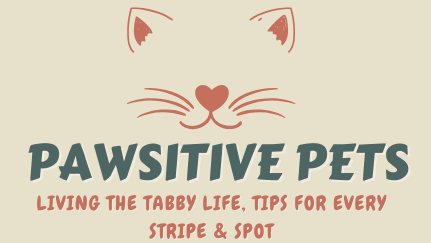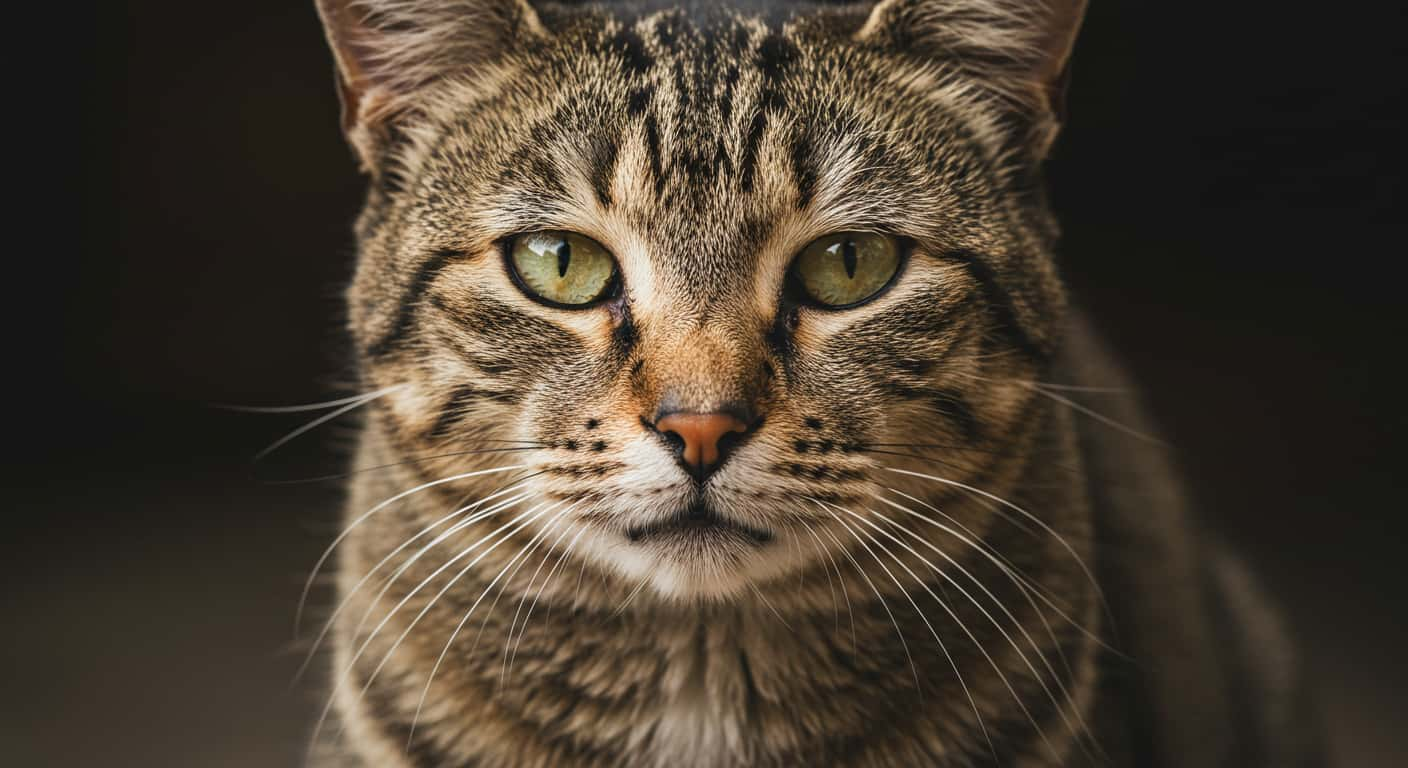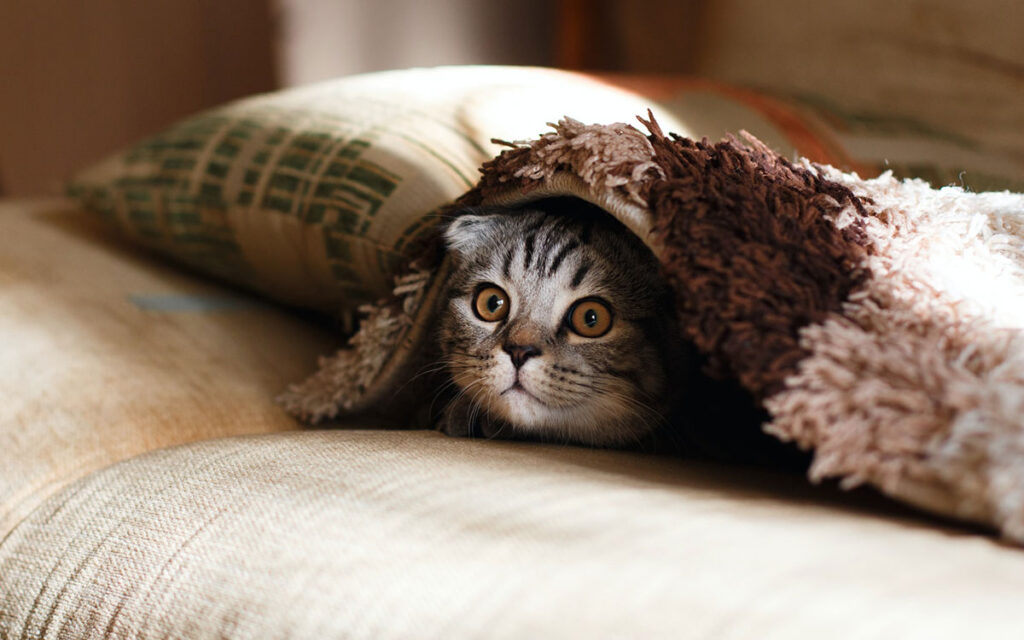Senior Tabby Cat Care refers to the specialized approach needed to look after tabby cats as they enter their senior years, typically around 10-12 and beyond, recognizing their unique health, behavioral, and nutritional needs during this life stage.
As “Luna, my shy tabby with a loud purr, is the inspiration behind all our cat care content here,” shares the heart behind this website, my personal connection drives this comprehensive guide. Just like Luna, every tabby cat with their distinctive striped, swirled, spotted, or blotched coat deserves extra care and attention as they gracefully transition into their senior years.
This expert-level guide, rooted in veterinary science, will empower you to provide the very best for your cherished tabby companion during their golden years. This is where Senior Tabby Cat Care truly makes a difference. By understanding and thoughtfully addressing their evolving needs, you can significantly enhance their quality of life and extend your cherished time together.
Table of Contents
Understanding and Providing Excellent Senior Tabby Cat Care
Providing exceptional Senior Tabby Cat Care is more than just routine; it’s about deeply understanding the shifting needs of your feline companion as they mature. For devoted owners of tabby cats, recognizing the specific requirements of this special life stage is absolutely paramount. As your tabby cat gracefully reaches their senior years, marked by subtle changes in behavior, activity, and overall health, their health, behavior, and nutritional needs will evolve considerably.
This guide is specifically designed to equip you with the knowledge and practical tools necessary for delivering optimal Senior Tabby Cat Care, ensuring your tabby enjoys a life that is not only long but also comfortable and filled with joy in their later years. You can learn more about tabby cat characteristics on our website.
The tabby pattern, a beautiful and common characteristic in many cat breeds, makes your feline friend unique. Whether your cat is a classic mackerel tabby, a blotched tabby, or a ticked tabby, the fundamental principles of Senior Tabby Cat Care remain essential as they age. Recognizing the physiological and behavioral transitions of their senior years is the very foundation of providing the specialized and loving care they deserve. As the creator of this website beautifully puts it, “Growing up with my grandmother’s fluffy white cat, Mimi, taught me the profound joy and responsibility of caring for a feline companion,” a sentiment that resonates deeply with the dedication required for Senior Tabby Cat Care.
Debunking Common Misconceptions About Senior Cat Care
One widely held misconception is that older cats primarily need a warm place to nap and minimal interaction. However, as any dedicated owner knows, senior cats thrive on consistent enrichment, regular social engagement, and careful health monitoring, all integral pillars of responsible Senior Tabby Cat Care.
Another common myth is that the health challenges associated with aging are simply an inevitable part of life that cannot be meaningfully addressed. In reality, with proactive and well-informed Senior Tabby Cat Care, which includes early detection of potential issues and the implementation of appropriate management strategies, many age-related conditions can be effectively managed, significantly improving your tabby’s comfort and overall quality of life.
The creator of this website emphasizes, “We didn’t just raise pets, we grew up with them as our siblings, our best friends, and our greatest teachers,” a perspective that underscores the active and engaged role we should take in our senior tabby’s well-being. You can explore more about tabby cat personalities on our site.
Understanding the Unique Needs of Your Aging Tabby Cat
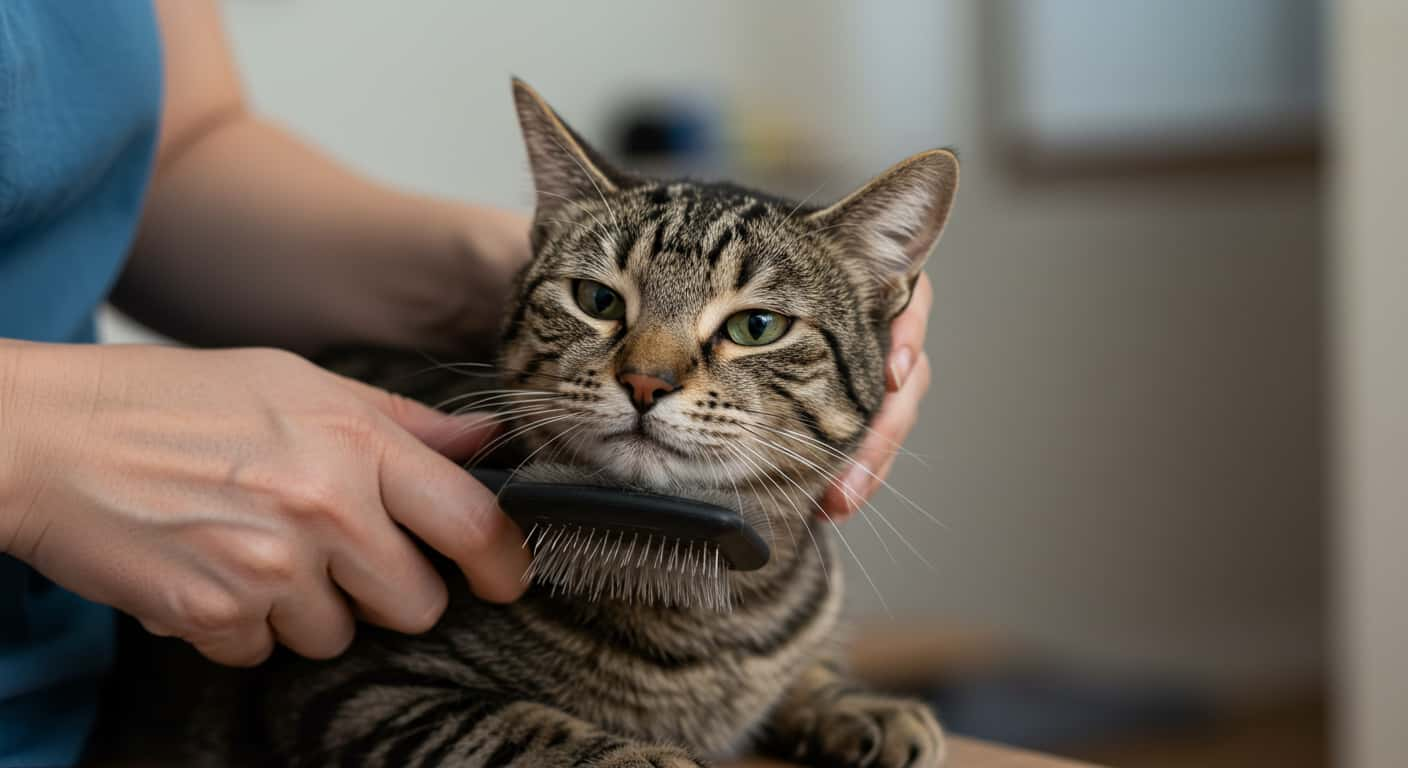
While “tabby” refers to a coat pattern rather than a specific breed, possessing a solid understanding of the core characteristics of domestic cats is foundational to providing excellent Senior Tabby Cat Care. Cats, including your cherished tabby, are obligate carnivores with very specific dietary needs that must be met for them to thrive. They are also renowned for their innate independence, remarkable intelligence, and deeply ingrained natural instincts for activities like hunting and exploration. As your tabby gracefully transitions into their senior years, these inherent traits will interact with the natural aging process, ultimately shaping their precise and individual care requirements.
How Feline Characteristics Influence Senior Tabby Cat Care
As tabby cats embark on their senior journey, their nutritional needs will likely undergo changes due to a natural slowing of their metabolism and the potential emergence of dental sensitivities, a critical aspect to consider in providing comprehensive Senior Tabby Cat Care.
Age-related mobility challenges, such as arthritis, might gradually limit their physical activity, making thoughtful and practical adjustments to their familiar living environment essential to ensure their continued safety, comfort, and overall well-being. Furthermore, senior tabbies, much like other older cats, can experience varying degrees of cognitive changes as they age, which may subtly or more overtly affect their behavior and the way they interact with both you and their surroundings.
Offering a patient and understanding approach to their care, specifically tailored to these individual changes, becomes paramount. In addition to these considerations, it’s important to remember that senior tabby cats, just like all older felines, are more prone to developing certain age-related health conditions, including arthritis, chronic kidney disease, and hyperthyroidism.
Early detection of these potential issues, coupled with consistent and proactive management guided by regular veterinary check-ups, are absolutely vital for ensuring that your senior tabby enjoys the highest possible quality of life in their later years.
“Because cats over the age of 10 are deemed ‘senior,’ the guidelines emphasize the importance of regular veterinary visits for senior cats and recommend a minimum of every 6 months for felines 10-15 years of age; every 4 months for healthy cats over the age of 15,” as highlighted by the American Association of Feline Practitioners (AAFP), underscoring the critical role of professional guidance in Senior Tabby Cat Care. You can find more information about common tabby cat health issues on our website.
Core Principles of Comprehensive Senior Tabby Cat Care
Providing exceptional Senior Tabby Cat Care is built upon a foundation of several core principles, all firmly rooted in the advancements of veterinary science:
- Nutritional Considerations in Senior Tabby Cat Care: Meeting the dietary needs of your senior tabby is an absolutely crucial aspect of their overall care. Older cats often benefit from food that is easily digestible to accommodate potential digestive changes, potentially lower in calories to prevent unwanted weight gain if their activity levels have decreased, yet consistently rich in high-quality animal protein to help them maintain vital muscle mass and support organ function. Moreover, many commercially available senior-specific cat food formulas are thoughtfully enriched with targeted supplements, such as glucosamine and chondroitin to promote joint health and function, as well as antioxidants and other nutrients designed to support cognitive health. Veterinary experts strongly emphasize the importance of carefully tailoring your senior tabby’s diet to their individual health profile, taking into account any existing medical conditions and their daily activity levels. Consulting with your veterinarian is the best way to ensure you are providing the most appropriate nutrition for your beloved senior tabby. For detailed guidance, visit our page on tabby cat diet and nutrition.
- The Importance of Regular Health Monitoring in Senior Tabby Cat Care: Consistent and proactive veterinary check-ups are not just recommended; they are absolutely vital for the early detection and effective management of any age-related diseases or health concerns that may affect your senior tabby cat. Leading veterinary organizations, including the American Animal Hospital Association (AAHA) and the American Association of Feline Practitioners (AAFP), advocate for more frequent veterinary visits for senior pets compared to their younger counterparts. A general guideline is that senior cats should undergo a comprehensive veterinary examination at least twice a year. These thorough check-ups typically involve a complete physical assessment, where your veterinarian will carefully evaluate all of your senior tabby’s body systems. Additionally, essential diagnostic tests, such as blood work and urine analysis, are crucial for screening for common age-related conditions like kidney disease, diabetes, and hyperthyroidism, which are more prevalent in older cats. In some cases, your veterinarian might also recommend imaging tests like X-rays to further assess your senior tabby’s overall health. The information gleaned from these regular check-ups is invaluable in establishing a baseline for your cat’s health and in identifying any subtle changes or developing issues in their earliest, most treatable stages.
- Creating an Adapted Environment for Your Senior Tabby Cat: Ensuring that your senior tabby lives in a home environment that is both safe and comfortable, while also providing easy access to all of their essential resources, is a cornerstone of providing responsible Senior Tabby Cat Care. As cats age, they may experience a decline in their physical abilities, particularly if they develop conditions such as arthritis or other musculoskeletal issues. To accommodate these potential challenges, consider making thoughtful modifications to your home. Providing soft and supportive bedding in quiet and warm areas will offer your senior tabby a comfortable place to rest and can help to alleviate any discomfort they might be experiencing. Make sure that their food and water bowls are placed in locations that are easily accessible, ideally on the same level as their resting areas, to minimize the need for excessive stretching or jumping. You might also want to consider switching to litter boxes that have low sides, making them much easier for an older cat with stiff joints or reduced mobility to enter and exit comfortably. By making these simple yet effective adjustments, you can significantly enhance your senior tabby’s comfort and overall well-being, allowing them to navigate their environment with greater ease and confidence.
- Understanding and Responding to Behavioral Changes in Senior Tabby Cats: Observing and understanding any shifts in your senior tabby’s behavior is a critical aspect of providing attentive and responsive care. Just as their physical bodies undergo changes with age, senior cats can also experience alterations in their behavior. These changes can sometimes be subtle and gradual, while at other times they might be more pronounced. It’s important to recognize that behavioral changes in senior cats can be indicative of a variety of underlying factors, including the development of medical conditions that are causing pain or discomfort, sensory decline such as loss of vision or hearing, or even the onset of cognitive decline, a condition similar to Alzheimer’s disease in humans. By being attuned to your senior tabby’s typical routines and demeanor, you will be better equipped to notice any deviations that might warrant further investigation. For example, a cat who was once very social might start to withdraw and spend more time alone, or a cat who has always been meticulous about using the litter box might start having accidents outside of it. Increased vocalization, especially at night, or signs of confusion and disorientation are other behavioral changes that can be concerning in senior cats. When you observe any such changes in your senior tabby, it’s important to consult with your veterinarian. They can help you to determine the underlying cause of the behavioral shifts, whether it’s related to a medical issue, cognitive decline, or another factor. Based on their assessment, your veterinarian can then provide you with appropriate guidance and strategies for managing these changes, ensuring that you are providing the best possible support and care for your aging feline companion.
Providing Practical, Actionable Guidance for Senior Tabby Cat Care
Here’s how you can implement effective Senior Tabby Cat Care in your daily routine, drawing upon the experiences of dedicated pet owners and the expertise of veterinary professionals:
Daily Care for Your Senior Tabby Cat
- Consistent and Appropriate Feeding: One of the most fundamental aspects of caring for your senior tabby is providing them with a diet that meets their specific nutritional needs. Choose a high-quality senior cat food formula that is appropriate for their age, weight, and any underlying health conditions they might have. It’s important to feed your senior tabby at consistent times each day to help establish a predictable routine, which can be particularly comforting for older cats. Carefully monitor your senior tabby’s appetite and their daily water intake to make sure they are staying properly hydrated. As cats age, they can sometimes become more prone to dehydration, so you might want to consider incorporating wet food into their diet, either as a supplement to dry kibble or as their primary source of nutrition. Wet food has a higher moisture content and can be easier for senior cats with dental problems to eat. Your veterinarian can provide personalized recommendations on the best type and amount of food to feed your senior tabby based on their individual needs. You can find more tips on this page about tabby cat diet.
- Gentle and Regular Grooming: Make gentle grooming a regular part of your routine with your senior tabby, ideally aiming for daily sessions or at least several times a week. As cats age, and particularly if they develop conditions like arthritis, they may find it increasingly difficult to groom themselves effectively. Regular brushing offers a multitude of benefits for your senior tabby. It helps to remove loose fur, preventing painful mats from forming, and it also stimulates healthy circulation in their skin. Furthermore, grooming sessions provide you with an excellent opportunity to closely examine your cat’s body, allowing you to check for any new lumps, bumps, skin irritations, or changes in their overall condition that might warrant a visit to the veterinarian. Use a soft brush that is comfortable for your senior tabby’s potentially more sensitive skin, and be gentle, especially around any areas where they might be experiencing discomfort or stiffness. Many senior cats find the quiet and gentle attention during grooming to be very soothing, and it can also help to strengthen the bond between you and your beloved feline companion. For more detailed guidance, visit our page on tabby cat grooming.
- Encouraging Gentle Play and Providing Mental Enrichment: While your senior tabby’s days of high-energy chasing might be behind them, it’s still important to provide opportunities for gentle play and mental stimulation. Engaging in low-impact play sessions can help your senior cat maintain a healthy level of physical activity, which is beneficial for their overall well-being, helping to keep their muscles toned and their joints mobile. Choose toys that don’t require a lot of strenuous activity, such as a feather wand that you can move slowly for them to bat at, or a soft toy that they can gently pounce on. Providing access to scratching posts is also important, as it allows them to maintain their claws comfortably. Additionally, consider introducing puzzle feeders into their routine. These can offer valuable mental stimulation by encouraging your senior tabby to work for their food, which can help to keep their minds sharp and engaged. Ensure that your senior tabby also has several comfortable and quiet resting spots around the house where they can retreat to feel safe, secure, and warm. These could include soft beds, blankets in sunny spots, or even quiet corners where they can observe their surroundings peacefully.
- Attentive Observation of Health and Behavior: One of the most important aspects of providing excellent care for your senior tabby is being a keen and observant caregiver. Pay close attention to any subtle changes in your cat’s behavior, their eating and drinking habits, how often and how easily they use the litter box, their overall energy levels throughout the day, and their general mobility. Make detailed notes of any changes you observe, no matter how small they might seem initially, and be sure to discuss these observations with your veterinarian during their regular check-ups. These seemingly minor details can often provide valuable clues to underlying health issues that might be developing, allowing for earlier diagnosis and more effective intervention. For instance, a slight decrease in appetite, a change in the frequency of urination, or a subtle shift in their grooming habits could all be indicators of a potential problem. By being proactive and communicating your observations to your veterinarian, you are playing a vital role in ensuring that your senior tabby receives the best possible care tailored to their individual needs. Consider using our downloadable Senior Tabby Symptom Tracker (link will be provided below) to help you monitor these changes effectively.
Sample Weekly Care Routine for Your Senior Tabby Cat
| Day | Morning | Afternoon/Evening | Notes |
|---|---|---|---|
| Monday | Feed a nutritious breakfast, followed by a light and gentle grooming session. | Engage in a short, gentle play session, and take a moment to observe your senior tabby’s overall activity levels throughout the afternoon and evening. | Specifically check your senior tabby for any signs of stiffness, especially after they’ve been resting, or any instances of limping. |
| Tuesday | Provide a balanced breakfast, and make a point to carefully check how much water your senior tabby is drinking. | Engage in a brief interactive play session that caters to their energy levels. Ensure their favorite bedding areas are still comfortable and easily accessible. | Make sure the litter box is clean and readily accessible to your senior tabby, perhaps considering a low-entry option if they have mobility issues. |
| Wednesday | Start the day with a healthy breakfast, followed by a more thorough grooming session, paying attention to any areas they might have difficulty reaching themselves. | Take some time to quietly observe your senior tabby’s general behavior and their appetite during the day. | Take the opportunity to gently feel for any new lumps, bumps, or skin changes that might have appeared. |
| Thursday | Offer a nutritious breakfast and make sure your senior tabby has plenty of fresh water available throughout the day. | If your senior tabby is still mobile and enjoys it, encourage a short, gentle exploration around a safe area of the house. | Be mindful of any subtle signs of disorientation or confusion. |
| Friday | Begin with a healthy breakfast, followed by a light and comfortable grooming session. | Introduce a puzzle feeder filled with a small portion of their daily food, or offer another type of enrichment toy to keep their mind engaged. | Pay attention to your senior tabby’s litter box habits, noting the frequency and consistency of their output. |
| Saturday | Provide a nourishing breakfast and ensure their food and water bowls are adequately filled for the day. | Dedicate some extra time to engage in a longer, but still gentle, play session using their most beloved toys. | Spend some additional quality time simply being present with your senior tabby – perhaps sitting with them while they nap, gently stroking their fur, or talking to them softly. |
| Sunday | Start the day by assessing your senior tabby’s overall health and well-being, noting their energy levels and general demeanor. | Take a few moments to plan for the upcoming week in terms of their care and check your supply of essential items such as their specific food, cat litter, and any necessary medications. | Make a point of noting down any specific health or behavioral concerns you’ve observed throughout the week so you can discuss them with your veterinarian if needed. |
How-To: Reading Labels & Making Informed Choices for Your Senior Tabby
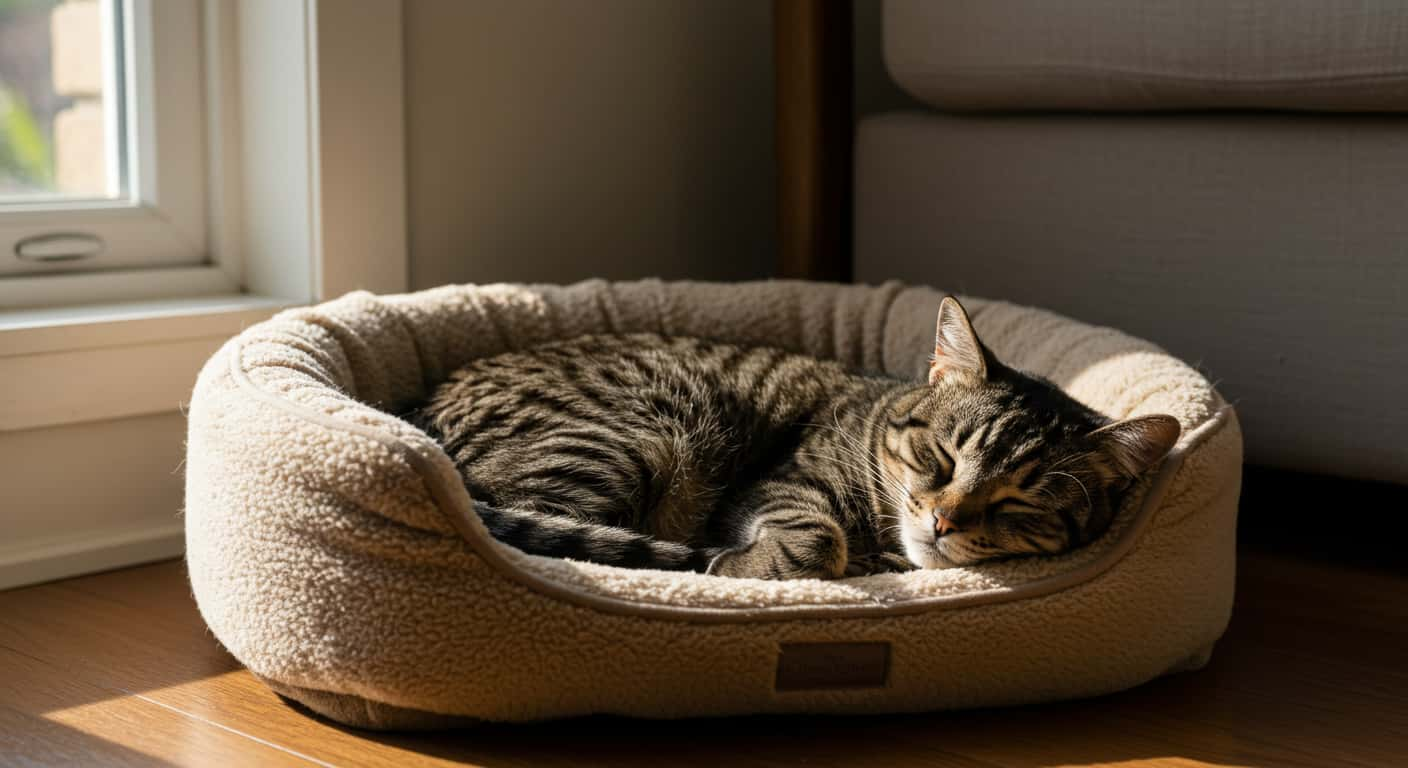
When selecting the most appropriate food for your senior tabby, taking the time to carefully read and understand the ingredient label is an essential aspect of responsible pet ownership. Look for high-quality animal protein sources listed as primary ingredients, specifically senior-formulated foods, easily digestible components, and beneficial supplements like Omega-3 fatty acids and joint support aids.
It’s generally advisable to avoid foods with excessive amounts of fillers or artificial additives. If you ever have any questions or concerns about your senior tabby’s dietary needs, it’s always best to consult with your veterinarian. Use our downloadable Senior Tabby Food Comparison Chart (link will be provided below) to help you evaluate different food options based on your cat’s specific needs and preferences.
Addressing Special Health Needs of Your Senior Tabby Cat
As tabby cats gracefully advance into their senior years, they may become more susceptible to certain age-related health conditions. Being well-informed about these potential issues is paramount for ensuring your senior tabby enjoys the highest possible quality of life and that you can provide them with the most appropriate and timely care.
Arthritis in Senior Tabby Cats
- Symptoms: Look for decreased activity, stiffness, reluctance to jump, limping, and increased irritability.
- Management: Provide comfortable bedding, consider ramps, and consult your vet for pain management options.
- Vet Statement: “Early intervention is key in managing arthritis for senior cats,” advises Dr. Jane Lee from the Feline Veterinary Specialists Association.
Chronic Kidney Disease (CKD) in Senior Tabby Cats
- Symptoms: Watch for increased thirst and urination, weight loss, and decreased appetite.
- Management: This often involves a special diet, increased fluid intake, and medication.
- Expert Opinion: The American Veterinary Medical Association (AVMA) notes that “senior pets often need foods that are more easily digested, provide different energy levels and ingredients, and contain anti-aging nutrients,” which is particularly relevant for managing CKD.
Hyperthyroidism in Senior Tabby Cats
- Symptoms: Be aware of weight loss despite a good appetite, increased activity, and thirst.
- Management: Treatment can include medication, radioactive iodine therapy, or dietary changes.
Feline Cognitive Dysfunction (FCD) in Senior Tabby Cats
- Symptoms: Signs may include disorientation, changes in sleep patterns, and altered interactions. Refer to our infographic on “Signs of Cognitive Decline in Senior Cats” below for more details.
- Management: A consistent routine and a safe environment are crucial.
When to Consult a Professional
If you notice any significant changes in your senior tabby’s health or behavior, it’s crucial to consult your veterinarian promptly. They can provide the most accurate diagnosis and guide you on the best course of action for your furry friend. Consider using our downloadable Senior Tabby Health Symptom Tracker (link below) to document these changes for your vet.
Monitoring and Adapting Care for Your Senior Tabby
Regular monitoring of your senior tabby’s health and behavior is essential. Adjust their care based on your observations and veterinary advice. Use our downloadable Senior Tabby Care Checklist (link below) to help you stay organized and ensure you’re covering all the key aspects of their care.
Troubleshooting Common Issues
- For decreased appetite, consult your vet for tailored advice.
- For litter box issues, ensure accessibility and cleanliness. Consider a low-entry box and consult your vet to rule out medical reasons.
- For reduced mobility, make environmental adjustments like ramps and ensure essentials are easily reachable. Discuss pain management with your vet.
Debunking Myths, Answering FAQs, & Sharing Facts About Senior Tabby Cats
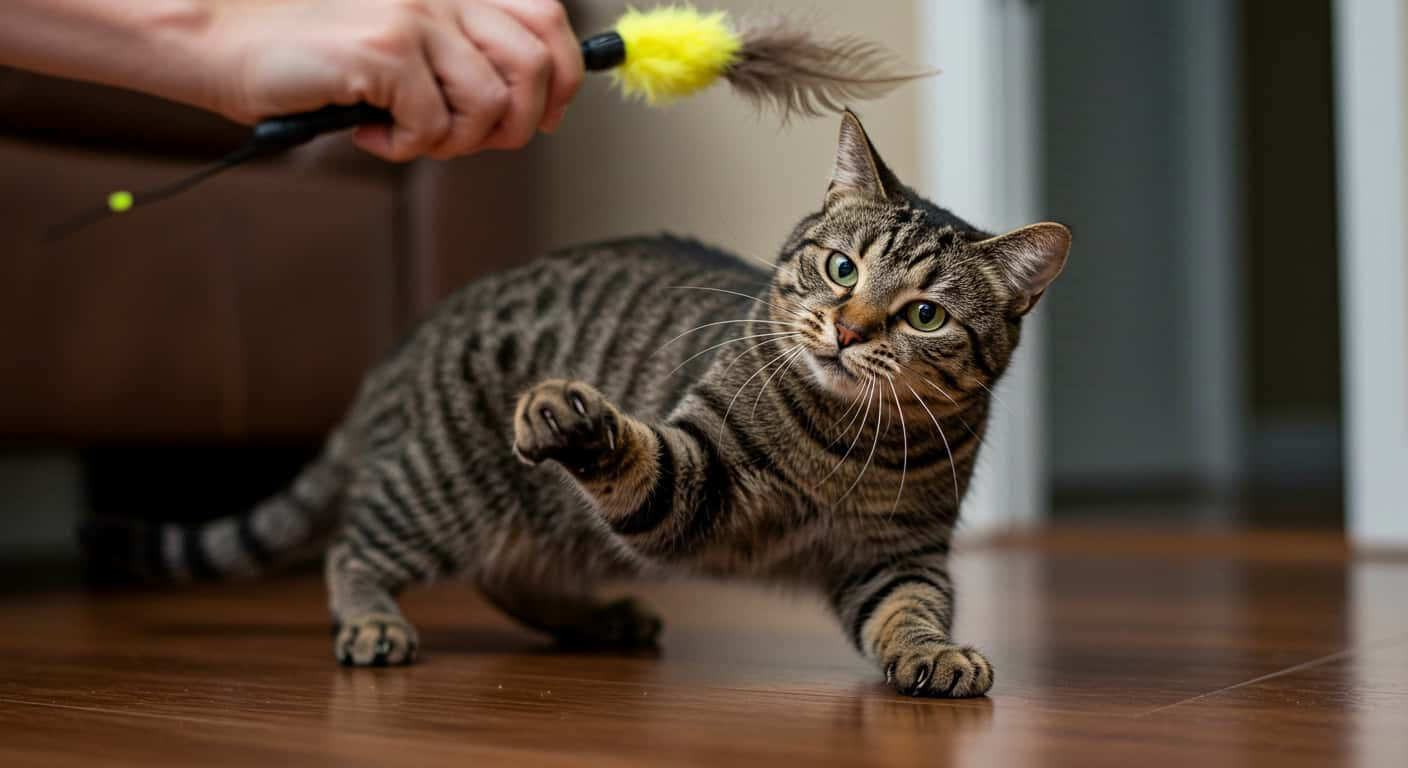
Common Myths
- Myth: Senior cats don’t need vaccinations. Fact: They do. Consult your vet for the recommended schedule.
- Myth: Weight loss is a normal sign of aging in cats. Fact: Significant weight loss can indicate a health problem and requires veterinary attention.
Frequently Asked Questions About Senior Tabby Cat Care
Visit our comprehensive Senior Tabby Cat Care FAQ section below, addressing common questions from pet owners like you. We aim to provide concise and helpful answers to capture relevant search queries and potentially be featured in Google’s featured snippets.
Fun Facts About Tabby Cats
Did you know that the word “tabby” dates back to the 17th century! And as the inspiration for this website, Luna, proves, their personalities are just as unique as their stripes. You can read more about tabby cats on our site.
Authority & Trust Signals
This guide is based on veterinary recommendations and guidelines from organizations like the AAFP and AVMA, as well as our personal experiences with Luna. Always seek professional veterinary advice for your senior tabby’s specific health needs.
Conclusion & Takeaways for Senior Tabby Cat Care
Providing excellent Senior Tabby Cat Care ensures a happy and healthy life for your beloved tabby in their golden years. Remember to focus on their individual needs, consult your veterinarian regularly, and cherish the time you have together. As the inspiration for this website reminds us, the bond with our senior pets is truly special.
Quick-Reference Checklist for Senior Tabby Cat Care
Daily: Feed senior-specific food, provide fresh water, gentle grooming, observe health and behavior, offer gentle play.
Weekly: More thorough grooming, check bedding comfort and accessibility, clean litter box thoroughly, monitor weight if possible.
Monthly: Review health and behavior notes, ensure adequate supplies, spend dedicated bonding time.
Call to Action
Download our printable Senior Tabby Care Checklist here
You can also download our Senior Tabby Health Symptom Tracker here
To help you monitor your cat’s well-being. Stay tuned for our Senior Tabby Food Comparison Chart coming soon!
Do you have questions about your senior tabby? Check out our Senior Tabby Cat Care FAQ below or leave a comment to share your experiences! We encourage you to share your own success stories with your senior tabby in our community section below to help other owners.
Senior Tabby Cat Care FAQ
How to take care of a 14-year-old senior cat?
Caring for a 14-year-old senior cat involves several key aspects, all covered in detail in this guide:
Nutrition: Feed a high-quality senior cat food that is easily digestible and meets their specific needs. Consider wet food for hydration and easier chewing. Monitor their appetite and weight.
Health Monitoring: Schedule regular veterinary check-ups (at least twice a year, or more as recommended by your vet) to detect and manage age-related health conditions like arthritis, kidney disease, or hyperthyroidism. Pay close attention to any changes in behavior, appetite, litter box habits, or activity levels and report them to your vet.
Environmental Adjustments: Make your home comfortable and accessible for your senior cat. Provide soft bedding in warm spots, ensure food and water bowls are easy to reach, and offer litter boxes with low sides if they have mobility issues.
Gentle Care: Groom your cat regularly and engage in gentle play to keep them physically and mentally stimulated.
Love and Attention: Spend quality time with your senior cat, offering comfort and reassurance.
How many hours should a senior cat sleep?
Senior cats can sleep quite a lot! Just like kittens, older cats may sleep anywhere from 16 to 20 hours a day. If you notice significant changes in your senior cat’s sleeping patterns, it’s always a good idea to consult with your veterinarian to rule out any underlying health issues.
What to feed a senior cat to gain weight?
A: If your senior cat needs to gain weight, consider the following:
Switch to a higher-calorie senior cat food: Look for formulas that are specifically designed to help older cats maintain a healthy weight or even gain weight if needed.
Offer more palatable food: Wet food is often more appealing to cats and can help increase their overall calorie intake. You can also try warming their food slightly to enhance its aroma.
Consider adding a supplement: There are high-calorie supplements available for cats; however, always consult with your veterinarian before introducing any new supplements to ensure they are appropriate for your cat’s health needs.
Rule out underlying health issues: Weight loss in senior cats can sometimes be a sign of an underlying medical condition, so it’s important to consult with your veterinarian to determine the cause and the best course of action for safe weight gain. They may recommend a specific diet or treatment plan.
How often should my senior tabby see the vet?
The AAFP recommends at least every 6 months for cats 10-15 years old, and every 4 months for healthy cats over 15.
When should you put a senior cat down?
Deciding when it’s time to euthanize your senior cat is a very personal and difficult decision. It should be based on their overall quality of life. Consider the following factors:
Their ability to enjoy life: Are they still able to engage in activities they once enjoyed? Do they still show interest in food, play, or interacting with you?
Their level of comfort: Are they experiencing chronic pain or discomfort that cannot be adequately managed with medication?
Their ability to perform basic functions: Can they eat, drink, move around, and use the litter box without significant difficulty or distress?
More bad days than good days: If your cat’s moments of discomfort and suffering outweigh their moments of joy and comfort, it might be time to consider euthanasia.
It is essential to have an open and honest conversation with your veterinarian about your cat’s quality of life. They can provide valuable insights into your cat’s condition and help you make an informed and compassionate decision. Observing and keeping a record of your cat’s daily activities and well-being can also help you in this difficult process.
What are the best types of food for senior tabby cats?
Look for high-quality senior formulas, considering wet food for hydration and easier chewing. Consult our detailed Senior Tabby Food and Nutrition Guide [internal link] or your vet for specific recommendations.
How can I tell if my senior tabby is in pain?
Signs can include decreased activity, changes in grooming, hiding, increased irritability, and altered vocalization. Monitor these using our Senior Tabby Health Symptom Tracker [download link].
How can I make my home more accessible for my senior tabby with arthritis?
Consider using ramps or pet stairs, provide comfortable and easily accessible bedding, and ensure food, water, and litter boxes are conveniently located. Read our guide on Environmental Adaptations for Senior Tabby Cats for more tips.
Share Your Senior Tabby Success Story!
We’d love to hear about your experiences caring for your senior tabby cat! Share your tips, heartwarming stories, or any advice you’ve found helpful in our comments section below or on our dedicated community forum [link to forum if applicable]. Your insights can provide valuable support and encouragement to other senior cat owners.
Looking for a Feline-Friendly Vet? Check this guide about local veterinarians specializing in feline care
Seasonal Tips for Senior Tabby Care: Explore this tips about adapting care during summer (hydration, heat), winter (warmth, mobility), and holidays (stress-free environments)
Drop a comment or a question for more expert tips, exclusive content, and updates on Senior Tabby Cat Care! we love to hear from you.
